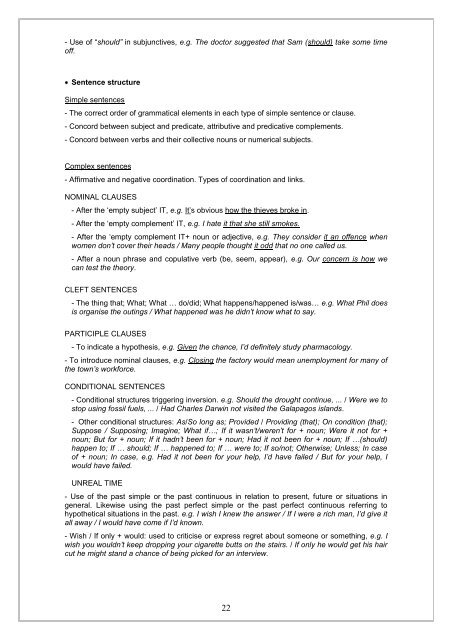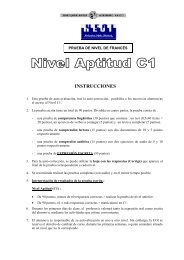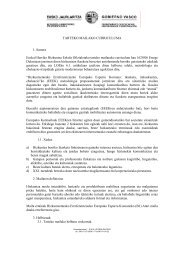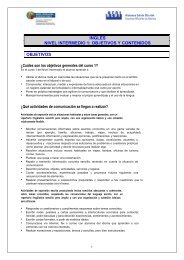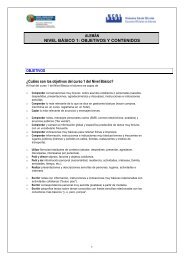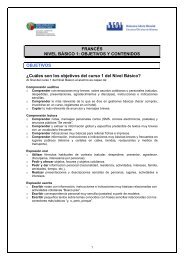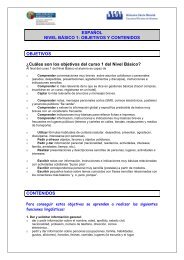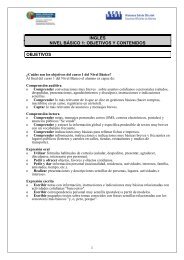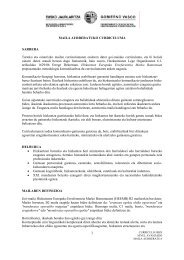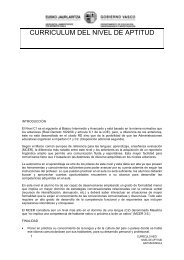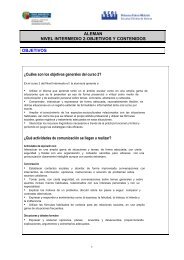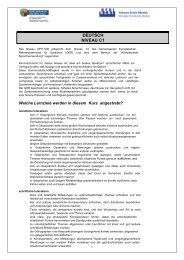C1 – Course Syllabus - Escuelas Oficiales de Idiomas del País Vasco
C1 – Course Syllabus - Escuelas Oficiales de Idiomas del País Vasco
C1 – Course Syllabus - Escuelas Oficiales de Idiomas del País Vasco
You also want an ePaper? Increase the reach of your titles
YUMPU automatically turns print PDFs into web optimized ePapers that Google loves.
- Use of “should” in subjunctives, e.g. The doctor suggested that Sam (should) take some time<br />
off.<br />
Sentence structure<br />
Simple sentences<br />
- The correct or<strong>de</strong>r of grammatical elements in each type of simple sentence or clause.<br />
- Concord between subject and predicate, attributive and predicative complements.<br />
- Concord between verbs and their collective nouns or numerical subjects.<br />
Complex sentences<br />
- Affirmative and negative coordination. Types of coordination and links.<br />
NOMINAL CLAUSES<br />
- After the „empty subject‟ IT, e.g. It‟s obvious how the thieves broke in.<br />
- After the „empty complement‟ IT, e.g. I hate it that she still smokes.<br />
- After the „empty complement IT+ noun or adjective, e.g. They consi<strong>de</strong>r it an offence when<br />
women don‟t cover their heads / Many people thought it odd that no one called us.<br />
- After a noun phrase and copulative verb (be, seem, appear), e.g. Our concern is how we<br />
can test the theory.<br />
CLEFT SENTENCES<br />
- The thing that; What; What … do/did; What happens/happened is/was… e.g. What Phil does<br />
is organise the outings / What happened was he didn‟t know what to say.<br />
PARTICIPLE CLAUSES<br />
- To indicate a hypothesis, e.g. Given the chance, I‟d <strong>de</strong>finitely study pharmacology.<br />
- To introduce nominal clauses, e.g. Closing the factory would mean unemployment for many of<br />
the town‟s workforce.<br />
CONDITIONAL SENTENCES<br />
- Conditional structures triggering inversion. e.g. Should the drought continue, ... / Were we to<br />
stop using fossil fuels, ... / Had Charles Darwin not visited the Galapagos islands.<br />
- Other conditional structures: As/So long as; Provi<strong>de</strong>d / Providing (that); On condition (that);<br />
Suppose / Supposing; Imagine; What if…; If it wasn‟t/weren‟t for + noun; Were it not for +<br />
noun; But for + noun; If it hadn‟t been for + noun; Had it not been for + noun; If …(should)<br />
happen to; If … should; If … happened to; If … were to; If so/not; Otherwise; Unless; In case<br />
of + noun; In case, e.g. Had it not been for your help, I‟d have failed / But for your help, I<br />
would have failed.<br />
UNREAL TIME<br />
- Use of the past simple or the past continuous in relation to present, future or situations in<br />
general. Likewise using the past perfect simple or the past perfect continuous referring to<br />
hypothetical situations in the past. e.g. I wish I knew the answer / If I were a rich man, I‟d give it<br />
all away / I would have come if I‟d known.<br />
- Wish / If only + would: used to criticise or express regret about someone or something, e.g. I<br />
wish you wouldn‟t keep dropping your cigarette butts on the stairs. / If only he would get his hair<br />
cut he might stand a chance of being picked for an interview.<br />
22


